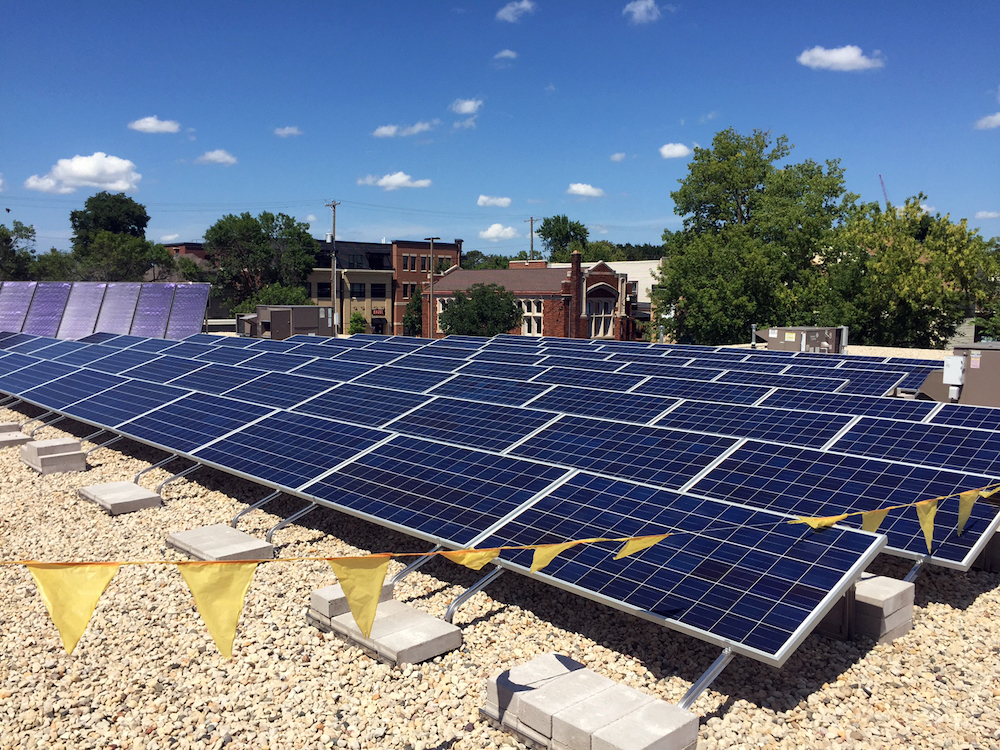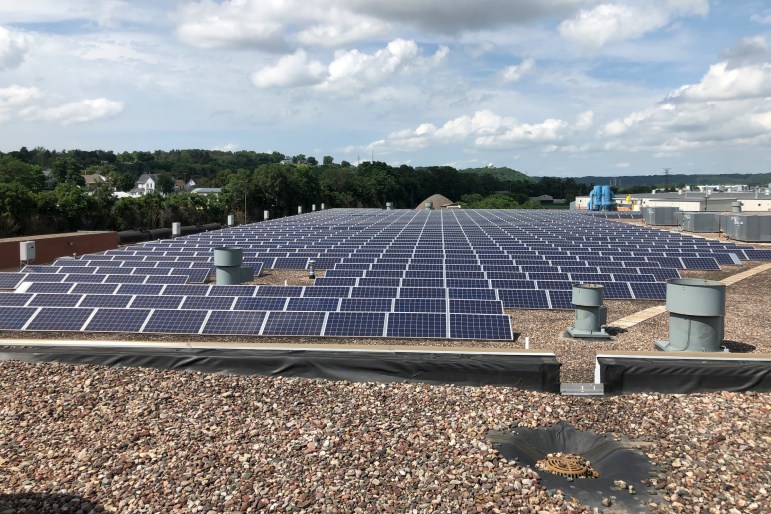Republicans Fire Regulator Over Solar, Low-Income Assistance Decisions
Tyler Huebner didn't follow the law say GOP senators. Democrats say move is purely partisan game.

A solar installation at the Willy Street Co-op grocery store in Madison, Wisconsin. Photo from the Willy Street Co-op.
Republicans in the Wisconsin Senate cited decisions by a utility regulator that have made it easier for some customers to afford their utility bills and install rooftop solar projects among the reasons for firing him this week.
On Tuesday, the Senate voted 21-11 to reject Tyler Huebner’s appointment to the Public Service Commission. Huebner, an appointee of Gov. Tony Evers, had been serving since 2020. He’s the governor’s 10th appointee to be rejected by GOP senators. In a separate vote, they confirmed Evers’ appointee, Summer Strand, to the commission in a 27-5 vote.
Democrats said the move was tied to “partisan political games.” But Republicans, like Sen. Julian Bradley, R-Franklin, accused Huebner of using his position as an activist and acting beyond his authority under state law.
“Their job is to be regulators, not policymakers,” Bradley said.
In a statement on his firing, Huebner said he’s proud of the decisions he made “to balance safety, reliability and affordability” in the services provided by utilities.
Concerns tied to income-based rates
Staff for Bradley said he wasn’t available for an interview Wednesday on the reasons behind his objection to Huebner. He had previously raised concerns about the commission’s decision in late 2022 to allow the Madison Water Utility to set up a customer assistance program. The two-year pilot program provides a $20 or $30 monthly discount to eligible low-income residents on their utility bill.
The program was tied to the approval of an 18 percent increase in revenues for the utility to fund the replacement of aging water mains. On the Senate floor Tuesday, Bradley said the program raised rates based on income, which he argued isn’t allowed under state law.
“No utility shall provide water service free or at a rate different than provided for in its rates,” Bradley said, quoting state statutes.
During a Senate utilities committee hearing last fall, Huebner told lawmakers the program wasn’t setting a rate that was different from other residential customers.
“What the program does is it does enable income-qualified customers who have also met their water conservation obligations, to get a discount (on their utility bill),” Huebner said.
He pointed to the commission’s final decision that outlined regulators have the authority to approve such programs as an incentive, rebate or utility service under state statutes. The decision also stated a number of utilities offer such incentives under commission-approved programs.

Municipalities are asking residents to keep a small stream of water running from a faucet to prevent frozen pipes. Photo: Public Domain.
All three members of the commission approved the utility’s rate increase. However, then-Commissioner Ellen Nowak, who now works for a company she once regulated, dissented on approval of the program. She said it violated state law preventing discriminatory rates. The law states no public utility may charge more or less for any service “relating to the production, transmission, delivery or furnishing of heat, light, water, or power.”
Tom Content, executive director of the nonpartisan Citizens Utility Board, advocates on behalf of customers in utility rate cases before the commission. He said rates are supposed to be fair from one customer to another.
Even so, Content noted the GOP-controlled Legislature has enabled entities like Foxconn and Microsoft to have market-based rates, which are tied to changes in the market rather than the cost of service. The provision was part of a 2017 law that would’ve provided nearly $3 billion in tax incentives to Foxconn in exchange for 13,000 jobs that never materialized.
“It’s not as if there aren’t discounted rates happening in Wisconsin,” Content said. “It’s just the ones that have been happening in Wisconsin are serving big business.”
Content noted there’s a lot of financial pressure on utility bills as utilities shift away from coal-fired power plants and make large investments in renewable energy, adding the commission has emphasized affordability in the clean energy transition.
A spokesperson with the Public Service Commission said no party in the Madison Water Utility case ever disputed whether the customer assistance program is legal, and no one has asked a court to review the program.
GOP lawmakers also express concerns over solar leasing
Sen. Van Wanggaard, R-Racine, also touched on concerns over Huebner’s decisions regarding third-party financing. Third-party financing allows solar developers to pay the upfront cost of solar installations and lease the systems to customers, who pay them off over time.
“He authorized a third-party solar arrangement in Stevens Point, despite a bill authorizing third-party solar arrangements being introduced and failing in the Legislature six or eight years in a row,” Wanggaard said in a statement Tuesday.
The GOP lawmaker wasn’t available for an interview on Wednesday.
In late 2022, Huebner was one of two utility regulators who voted to approve Vote Solar’s request to allow third-party financing to install solar on the home of a Stevens Point family.
While the solar leasing arrangements are common in some states, their legal status is unclear in Wisconsin. Guidance from the commission has indicated third-party financing of small-scale renewable projects would meet the definition of a public utility in Wisconsin, requiring developers to get approval to sell power.
Wisconsin law defines a public utility as any entity that provides “heat, light, water or power either directly or indirectly to or for the public.”
The legality of third-party financing has been left unresolved despite multiple court challenges and legislation that would have exempted providers of third-party owned systems from regulation as a public utility.

This solar array of 836 panels on the city of Dubuque, Iowa’s Municipal Services Center was the subject of a lawsuit that opened the door in Iowa for private companies to partner with governments and other entities to provide solar energy. In 2018, We Energies halted a third-party-owned installation for the city of Milwaukee, arguing that the solar developer would be acting as a public utility. Dubuque-based Eagle Point Solar was involved in both projects. Photo taken July 1, 2019. Courtesy of John Klostermann, City of Dubuque Public Works
Supporters of the financing arrangement say it’s similar to leasing a vehicle. The financing tool makes it more affordable for homeowners, schools and businesses to install rooftop solar. The lack of clarity restricts the number of entities who want to pursue such projects, according to Sam Dunaiski, executive director of the renewable energy group RENEW Wisconsin.
“In order to really speed up our energy transition, we need to have all the tools in our tool belt,” Dunaiski said.
The Wisconsin Utilities Association and other groups have opposed efforts to declare solar developers are not public utilities under the law. The group is seeking a review of the commission’s decision on Vote Solar’s request in Dane County Circuit Court. Bill Skewes, the association’s executive director, declined to comment on Huebner’s firing and objections raised by lawmakers.
The group that represents investor-owned utilities has argued such third-party arrangements would amount to deregulation. The group’s attorneys said in a filing on Vote Solar’s request that selling power through an unlimited number of such systems to an unlimited number of customers would make the seller a public utility.
Huebner has said that Wisconsin doesn’t have case law describing how to handle multiple pieces of equipment at multiple sites serving more than one customer. He and PSC Chair Rebecca Cameron Valcq, who is stepping down next month, stopped short of granting a similar petition by the Midwest Renewable Energy Association last year. The group wanted utility regulators to declare that such financing arrangements are legal on a broader scale
Editor’s note: The Citizens Utility Board and RENEW Wisconsin are underwriters of Wisconsin Public Radio.
Vote to oust utility regulator tied to low-income program, solar financing tool was originally published by Wisconsin Public Radio.





















